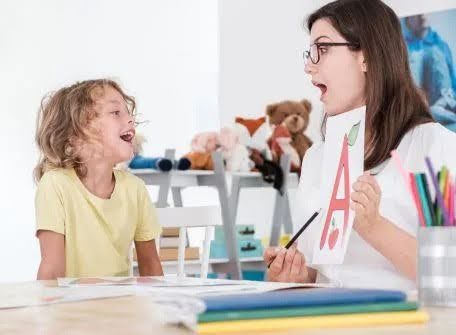“Mama”, and “dada” – these are the most soothing words parents patiently wait to hear from their children. However, for some children, there could be a delay in learning these words because of speech and language disorders, learning difficulties, neurological conditions and other issues.
Although the majority of the children grow like the other peers in the early years, many times, parents fail to detect the red flags that hinder the development of children.
Why do parents fail to detect the early problems of speech and language development in their children? One of our speech and language therapists at Hope AMC said – “ parents are fond of their kids. So, When they see their kids are not saying words like others of their age, they definitely get conscious. But, many of the time, they believe that maybe with time, their kids will learn to say those words. Now see, there lies the problem. I have even worked with kids whose parents brought them much later because they thought the problem would go away with time”.
In this blog, we will help parents or new parents to identify the red flags or the early signs that indicate their child may have problems with the smooth speech and language development and seek help from a therapist for pediatric speech therapy as early as they can.
Why is speech and language development necessary for children?
Speech and language – the key to mastering communication and conveying one’s own thoughts to the world. Any child who is lagging behind in learning speech and language skills, will not be able to comprehend what others are saying and respond accordingly.
From forming the first babble to making simple and complex sentences – no parent can deny the importance of the development of speech and language skills. This development is not just about learning words, instead, it is more like mastering the skills to build the skills that facilitate effective communication. The plus point is when a kid possesses the right speech and language skills, he/she learns to communicate with parents, friends or teachers smoothly. They learn how to express themselves, understand the instructions and execute them accordingly. They even excel academically and navigate social interactions.
As you can see, the foundation of the right speech and language development supports the cognitive and emotional development of the child.
RED flags to detect in speech and language development from 2-24 months
Cooing – This starts at 2-4 months. This is a stage where you see your baby start making specific vowel-like sounds, which is referred to as cooing. This is a process when the baby learns to control its vocal cords and starts to experiment with different sounds.
Babbling – This is another milestone that may start in between 6-8 months. Around Here you will find your infant starts to babbling. This is a process to produce more complex sounds. Specialists say this is the process of making sounds with consonants.
First Words – Your baby should learn a few first words at 12 months. These words could be “mama” or “dada.”
Vocabulary Growth – By the age of 18-24 months, toddlers should learn and expand their vocabulary rapidly. Parents may find how their toddlers are quickly learning new words. This is also the time when toddlers should comprehend and respond to simple directions.
If you see your little one is missing out on one of these above-mentioned milestones, you should definitely consult a speech and language therapist.
How to start?
Parents here play a crucial role in nurturing speech and language development. HOW? Because they are the very first teachers of their children. They are the ones with whom the kids spend their maximum time and learn from them. Therefore, parents should create an ideal environment where the kids can learn interactions, and conversations, and respond accordingly. Parents must create a rich language environment at home where they can use books, tools or daily-based activities to foster the learning.
Parents can approach a speech and language therapist or specialist. They can help you understand the early communication milestones that are crucial for the foundation for further development of your kid. The speech and language specialist can help you recognize signs of healthy development and as well as the red flags that indicate your child may have a speech and language disorder or other issue that is hindering their learning process.
How to find the most experienced speech and language specialists in Dubai?
Hope AMC is Dubai’s one of the prestigious pediatric rehabilitation centers that dedicatedly works for children with special needs. We have the world’s most competent and experienced speech and language therapists who have already worked with children having issues like Stuttering, Apraxia, Dysarthria, Articulation errors, Tongue-tie (ankyloglossia), Repetitive language disorders, Expressive language disorder, etc.
The therapists will closely observe your kid and how far he/she has speech and language ability. They may ask you about the family medical history, the birth story of your kid, complications, and other symptoms. Based on the assessment and through observation, the therapist will design a customized speech-language therapy for your kid. Children may also be recommended for intensive speech therapy(5 daily sessions for 3 consecutive weeks) for faster outcomes.
What to expect from speech therapy?
Children with Autism, Cerebral Palsy or other conditions may have the above-discussed types of speech and language disorders.
Speech therapy can be conducted in small groups, in classrooms or in one-on-one sessions. The therapy depends on the age, disorder type, and specific needs of your child.
The speech therapists interact with kids through different types of play-based activities. They engage children in communicating with them. They may use pictures, books and other tools for language intervention. The chief objective is to correct syllables and sounds for children to make them understand how to make the right sound.
Results?
Well, the therapists at Hope AMC have witnessed great outcomes of speech development for autism and other conditions. Customized speech therapy can improve the overall ability to understand and express ideas, thoughts, and feelings. It can additionally improve swallowing function, vocal quality, fluency of speech, pre-literacy and practical social skills, etc.
We involve parents/caregivers to help improve the primary speech, language, and communication difficulties of the kids. We also advise teachers to implement different techniques at nursery or school to help the kids even more.
How to book an appointment?
Hope AMC is open 7 days a week. You can visit our official site or call us to book an appointment.






